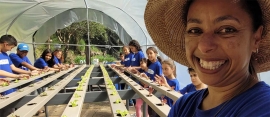BRAZIL: Youth develop sustainable gardens

Salesian missionaries educate youth about environmental responsibility
(MissionNewswire) Salesian missionaries in Brazil are teaching youth how to develop sustainable gardens both to provide an extra food source and to highlight the importance of caring for the environment. Many of the projects were motivated by the teachings of Pope Francis’ 2020 Laudato Si’, which underlined the importance of education and training that will help youth foster environmental responsibility.
At São Domingos Sávio Youth Center, 220 youth ages 6-16 are involved in a sustainable garden project that provides food for the surrounding communities. Ana Paula A. Carvalho Santos, social and educational manager, said, “In this project, children and adolescents plant, care for, harvest, and consume healthy food both at home and in the workplace. The garden serves different families and for the internal consumption of students, collaborators and Salesians.”
Students are involved in every aspect of the garden, from building the beds where the vegetables are planted to soil maintenance and harvesting. They also wash the vegetables before food preparation. Carvalho Santos added, “Then they go to the kitchen workshop, where they prepare food with their colleagues. The whole process is permeated by workshops and discussions on the environment, also involving parents. The division into fields, activities and workshops takes place by age groups to enhance learning.”
In addition, first- and third-year students at Salesian San Paolo School in Ascurra have developed a project to produce a composter and a sustainable vegetable garden. Youth contributed to planting the garden, producing compost, harvesting and selling products to the school community to make the garden sustainable. Composting reduces waste and has allowed students to observe the nutrient cycle used for the garden, turning organic waste into new soil. The vegetable garden has contributed to learning about food, nutrition and the importance of healthy habits.
Another project is the Urban Gardens project at the Jesus the Adolescent Youth Center located in the municipality of Três Lagoas. This project is carried out collaboration with the Suzano Company and the Cargill Foundation.
Started in 2022, the project transformed a piece of free land into an agro-ecological garden within an urban environment. This has promoted agro-ecological agriculture, improved the food quality and increased the self-esteem of the families involved, while providing a generation of income. In 2023, 40 families started the process of marketing products to strengthen their income. Participants will also have access to courses on entrepreneurship, sustainable agriculture, environmental education and family income.
A Salesian missionary said, “In these projects, students play an active part the educational process. Tending to these gardens teaches the importance in the conservation and care of the environment, reinforced the values of solidarity and respect for nature and others. Students experience the collective effort to produce something that will benefit everyone.”
According to the World Bank, the COVID-19 pandemic has had a devastating impact on Brazil with poverty tripling in 2021. Nearly 17 million people fell into poverty in the first quarter of the year and the poverty rate now is higher than it was a decade ago. Researchers estimate that 12.8% of Brazil’s population, some 27 million people, are now living below the poverty line.
Inequalities also exist in access to education and educational efficiency. These inequalities are greatest for children and youth who are poor, live in rural areas or who have an incomplete compulsory education. Salesians working with poor youth and their families in Brazil develop programs and provide youth with opportunities for furthering their education and skills.
###
Sources:
ANS Photo (usage permissions and guidelines must be requested from ANS)
ANS – Brazil – Sowing, caring for and harvesting: an educational process
Salesian Missions – Brazil
World Bank – Brazil





